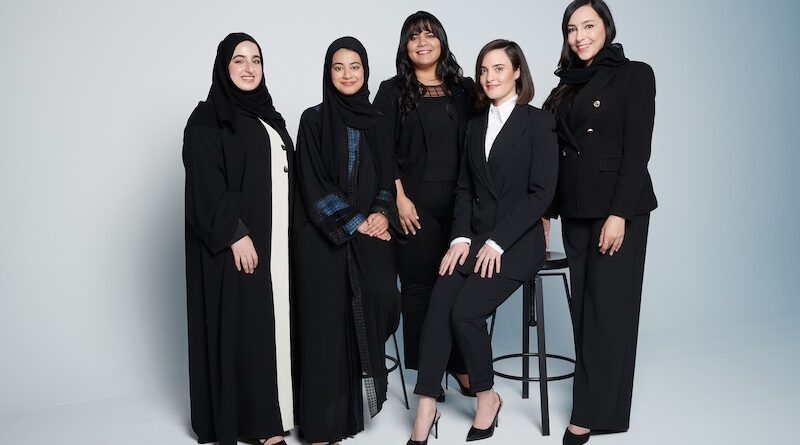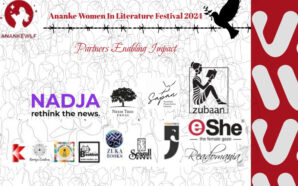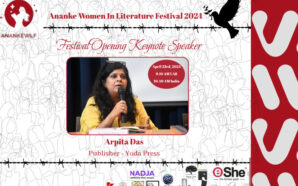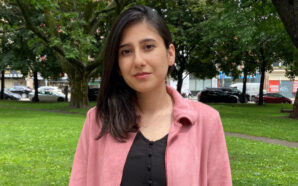December 22nd, 2022, (Dubai, UAE): In its ninth year, the L’Oréal-UNESCO For Women in Science Middle East Regional Young Talents Program, in partnership with Khalifa University of Science and Technology, has honored five visionary women from the GCC to recognize, and support furthering their groundbreaking research in the fields of Life Sciences, Physical Sciences, Mathematics and Computer Science.
The regional program is part of the L’Oréal-UNESCO’s global For Women in Science initiative that has already recognized over 3,900 phenomenal researchers and more than 100 Laureates from more than 110 countries and regions since its inception in 1998.
This year, grants were awarded to Post-doctorate Researchers Dr. Maha Zakariya Yahya Al-Riyami (Oman), Dr. Raefa Abou Khouzam (UAE) and Dr. Fatiha M. Benslimane (Qatar), who received EUR 20,000 each; and PhD students Hessa Ebrahim Ali Alfalahi (UAE) and Ayesha Abdulla Alkhoori (UAE), who were awarded EUR 8,000 each in their category. These women are playing a pivotal role in addressing critical global issues and paving the way forward for more young women to enter STEM fields. Since its inception in the region, the program has recognized 45 researchers from the UAE, Oman, Kuwait, Bahrain, Qatar, Saudi Arabia and Yemen.
The program continues to receive the endorsement for the fourth year in a row of H.E. Sarah Al Amiri, UAE Minister of State for Public Education and Advanced Technology and Chairwoman of the UAE Space Agency, who said: “Fondation L’Oréal and UNESCO’s initiative to recognize young women scientists continues to create an enabling environment for diversity in STEM. Over the past few years, we have seen a healthy increase in the representation of women in these fields, we know that there is a lot more work that needs to be done to foster career progression across organizations. Creating opportunities such as this is the essential first step to encouraging more young women researchers to push ahead and make a mark in the science and technology fields.”
Her Excellency added: “The Arab world has its share of pioneering women scientists, and their work has played a key role in addressing issues that impact global society. We can see examples of driving forward with diversity in the UAE, providing women with access to funding, career progression and equal-pay.”
The latest UNESCO Science Report recognizes the effort of many countries in the Arab world for achieving gender parity at the university level. The gap, however, widens as women enter the workplace with several barriers that set them back in their careers. Women researchers were found to have shorter, less well-paid positions, and were given smaller grants than their male counterparts.
The driving ethos behind the L’Oréal-UNESCO For Women in Science Program is ‘The world needs science and science needs women’. The program was created to break down barriers to progress for women in STEM and provide them with the tools to succeed.
Laurent Duffier, L’Oréal Middle East Managing Director, said that the initiative has been instrumental in unearthing the brightest minds and inspiring careers for future generations.
“The program has grown from strength-to-strength and so has the number of women scientists who are leading people-centered research and development. At L’Oréal Groupe, science and innovation are at the heart of everything that we do. Enabling and empowering emerging female scientists and their cutting-edge research is a mission that we are committed to, especially in this region where contributions by women scientists are vital to solutions for the emerging world. Our winners represent the most ambitious and passionate women in the region who are not deterred by any hurdle in their pursuit and commitment to finding novel solutions to problems that impact our communities, while also being a beacon of empowerment for young girls embarking on their careers in STEM.”
Dr. Arif Sultan Al Hammadi, Executive Vice-President, Khalifa University of Science and Technology said: “We only need to look within our own research-intensive academic institution to gauge the immense potential among the region’s women researchers who are ready to seize every opportunity to make a difference in our societies. Khalifa University is proud to boast several high-profile women scientists among our faculty and researchers. Now more than ever, we need women to take the lead in driving the industry 4.0 revolution and are proud to partner with the L’Oréal-UNESCO For Women in Science in the Middle East for the fourth year in a row to nurture their career development. The UAE has made great strides in ensuring equality and representation across the board, right from the education level to women spearheading key scientific and technological advancements, which has enhanced its global competitiveness. More such initiatives across the region and globally will secure a diverse and talented workforce in science and technology. “
Professor Mouïn Hamzé, President of Program’s Jury, added: “Equity, diversity and inclusion are the cornerstones of science and research. Women bring to the table perspectives and diverse viewpoints that are imperative to finding innovative solutions for pressing global issues, such as climate change, food insecurity, pandemics, future tech and cybersecurity. This program has successfully built a network of bright minds who have contributed to many advancements in these areas and continues to turn the tide on underrepresentation in the STEM fields by encouraging young women to pursue careers that respond to the needs of the society.”
About the 2022 Middle East Regional Young Talents
PhD students:
- Hessa Ebrahim Ali Alfalahi (UAE): For her research on early detection and diagnosis of depression and Parkinson’s disease using smartphone data collected in-the-wild through novel Artificial Intelligence (AI) algorithms
- Ayesha Abdulla Alkhoori (UAE): For her research on converting carbon dioxide (CO2) into clean fuel to alleviate global warming and provide a solution for the energy depletion crisis
Post-doctorate researchers:
- Maha Zakariya Yahya Al-Riyami (Oman): For her research on investigating somatic mutations in type 1 diabetes that can lead to new avenues for autoimmunity research.
- Raefa Abou Khouzam (UAE): For her research on investigating new treatment strategies to counter pancreatic cancer growth and evolution
- Fatiha M. Benslimane (Qatar) : For her research on developing a fast, reliable and cost-effective protocol for microbial analysis to allow real-time diagnosis
The 9th edition of the program housed an impressive jury of seven renowned experts from prestigious institutions in the Middle East including:
- Mouin Hamzé, President of the Jury, Former Secretary General of The National Council for Scientific Research, Lebanon.
- Maha Al Mozaini, King Faisal Specialist Hospital & Research Center, Saudi Arabia.
- Thurayya Arayssi, Weill Cornell Medical College, Qatar.
- Ameenah Farhan, Kuwait University and Kuwait Foundation for the Advancement of Sciences (KFAS), Kuwait.
- Habiba Al Safar, Khalifa University, United Arab Emirates.
- Fatma Taher, Zayed University, United Arab Emirates.
- Ramia AlBakain, The University of Jordan, Jordan.
About the Fondation L’Oréal
The Fondation L’Oréal supports and empowers women to shape their future and make a difference in society, focusing on three major areas: scientific research and inclusive beauty and climate action.
Since 1998, the L’Oréal-UNESCO For Women in Science program has worked to empower more women scientists to overcome barriers to progression and participate in solving the great challenges of our time, for the benefit of all. For 24 years, it has supported more than 3,900 women researchers from over 110 countries and regions, rewarding scientific excellence and inspiring younger generations of women to pursue science as a career. Convinced that beauty contributes to the process of rebuilding lives, the Fondation L’Oréal helps vulnerable women to improve their self-esteem through free beauty and wellness treatments. It also enables underprivileged women to gain access to employment with dedicated vocational beauty training. On average, around 21,000 people have access to these free treatments every year and more than 27,000 people have taken part in professional beauty training, since the beginning of the program. Finally, women are affected by persistent gender-based discrimination and inequalities, exacerbated by climate change. While they are on the frontline of the crisis, they remain under-represented in climate decision-making. The Women and Climate program of the Fondation L’Oréal supports, in particular, women who are developing climate action projects addressing the urgent climate crisis and raises awareness of the importance of gender-sensitive climate solutions.
About UNESCO
Since its creation in 1945, the United Nations Educational, Scientific and Cultural Organization (UNESCO) has worked to create the conditions for dialogue among civilizations, cultures, and peoples, based on respect for common values. UNESCO’s mission is to use its unique expertise in education, science, culture, communication and information to contribute to the building of peace, the eradication of poverty, sustainable development, and intercultural dialogue. The Organization has two global priorities: Africa and gender equality.
UNESCO is the only UN specialized agency with a specific mandate in the sciences, symbolized by the “S” in its acronym. Through its science-related programs, UNESCO contributes to the implementation of the United Nations Sustainable Development Goals, helps developing countries build their scientific and technological capacities, and supports Member States in their efforts to develop science policies and programs. UNESCO also supports Member States in their efforts to develop effective public policies that integrate local and indigenous knowledge systems.
UNESCO promotes scientific research and expertise in developing countries. The Organization leads several intergovernmental programs on sustainable management of freshwater, ocean and terrestrial resources, biodiversity conservation, and the use of science to address climate change and reduce disaster risk.
About Khalifa University of Science and Technology
Khalifa University of Science and Technology, the UAE’s top-ranked research-intensive institution, focuses on developing world leaders and critical thinkers in science, engineering and medicine. The world-class university endeavors to be a catalyst to the growth of Abu Dhabi and the UAE’s rapidly developing knowledge economy as an education destination of choice and a global leader among widely acknowledged international universities.
For more information, please visit: http://www.ku.ac.ae/











